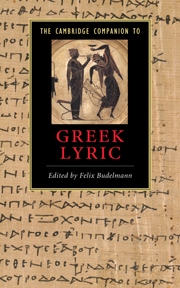Book contents
- Frontmatter
- Introducing Greek lyric
- Part I: Contexts and topics
- Part II: Poets and traditions
- Part III: Reception
- 16 Lyric in the Hellenistic period and beyond
- 17 Lyric in Rome
- 18 Greek lyric from the Renaissance to the eighteenth century
- 19 Sappho and Pindar in the nineteenth and twentieth centuries
- Epilogue
- 20 Lyric and lyrics: perspectives, ancient and modern
- Chronology of select melic, elegiac and iambic poets
- Further Reading
- Glossary
- List of works cited
- Index
19 - Sappho and Pindar in the nineteenth and twentieth centuries
from Part III: - Reception
Published online by Cambridge University Press: 28 May 2010
- Frontmatter
- Introducing Greek lyric
- Part I: Contexts and topics
- Part II: Poets and traditions
- Part III: Reception
- 16 Lyric in the Hellenistic period and beyond
- 17 Lyric in Rome
- 18 Greek lyric from the Renaissance to the eighteenth century
- 19 Sappho and Pindar in the nineteenth and twentieth centuries
- Epilogue
- 20 Lyric and lyrics: perspectives, ancient and modern
- Chronology of select melic, elegiac and iambic poets
- Further Reading
- Glossary
- List of works cited
- Index
Summary
During the last two centuries, classical literature has lost much of its hold on the European imagination, a process still being charted in our own time in the disappearance of classical knowledge and languages from educated discourse and from educational syllabi. Following the great age of creative engagement with Greek and (especially) Latin literature, the seventeenth and eighteenth centuries, the pace was already slowing in the first decades of the nineteenth century. Translation, it is true, continued apace, but attests the importance of Classics only in a paradoxical way: with the gradual decline of linguistic study, translations gave access to classical knowledge, still a mark of elite culture, without requiring lengthy study of Latin and Greek. And of course classical culture and languages alike declined still further in the twentieth century.
But against this general background a number of factors have assured the vitality of many facets of the classical tradition, including and especially Greek lyric. To begin with, there was the rise of interest in Greece as opposed to Rome. Poetic fashion also played a part: in particular the pre-eminence of lyric in Romantic and modernist poetics. Then, there were dramatic advances in the available knowledge of the Greek texts. In the nineteenth century, German scholarship made available the fullest and most authoritative collection of texts since the Renaissance, and in England inspired Henry Thornton Wharton to produce a popularising edition of Sappho which stimulated the imagination of writers and other artists. At the turn of the century the papyrus discoveries at Oxyrhynchus revived the appeal of antiquity in the most literal way, revealing anew fragments of text which had been unknown for the best part of two millennia.
- Type
- Chapter
- Information
- The Cambridge Companion to Greek Lyric , pp. 352 - 370Publisher: Cambridge University PressPrint publication year: 2009
- 2
- Cited by

